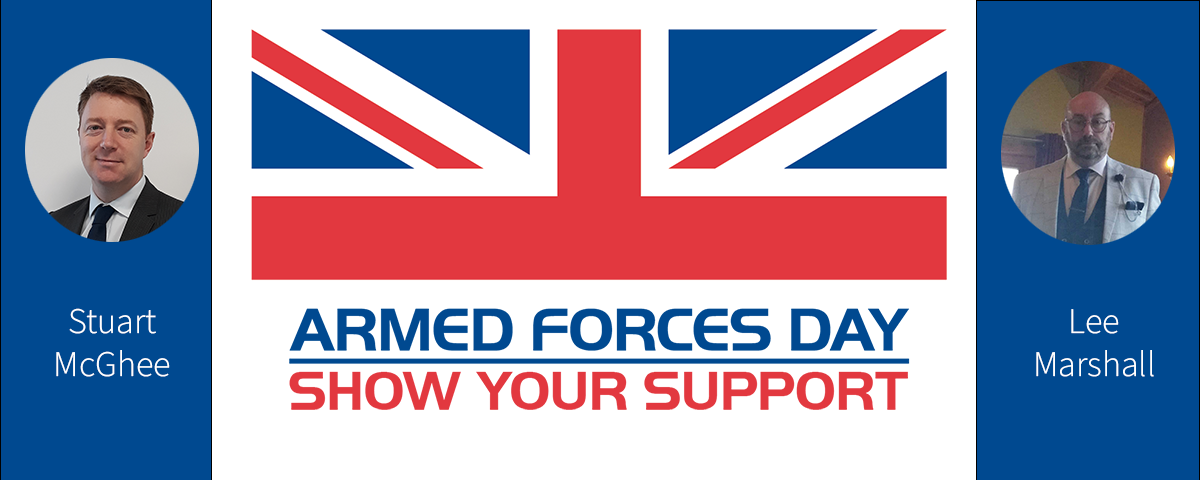
Whilst there are hundreds of different types of roles in the Armed Forces, it is often said that the career path is like no other. It almost goes without saying that those who sign up require a high level of integrity, discipline and commitment but anybody looking at a military career will also need to develop skills in communication, decision making, leadership and physical co-ordination amongst many other traits.
So, what happens when a military person decides to re-enter the civilian job world? How do they make that transition and transfer the skills and experience they have gained in this almost unique environment to be successful away from the forces?
In lead up to Armed Forces Day (Saturday 26 June) we will be speaking to Tetra Tech employee who have done just that, sharing their journeys and advice for those leaving the Armed Forces as well as employers who could benefit from the knowledge and skills of these Veterans.
Today we are sharing the experiences of Stuart McGhee who is an Associate Director in our project management Division and Lee Marshall who is a Principal Project Manager based at RAF Lossiemouth about their personal experiences.
Stuart was commissioned into the Royal Engineers in 2000 and left in 2015. In this time he deployed to Bosnia, Kosovo, Iraq and Afghanistan. He also lived in Germany for three years and has undergone exercises in Canada, Cyprus and Gibraltar. He undertook many roles in his time in the Corps, but primarily lead teams providing support to other branches of the Army. His leadership role included managing the careers of those under his command and ensuring that all personnel were well trained in order to deliver what was expected of them.
Speaking about the transition out of the Forces Stuart says, “Transition isn’t easy but finding an employer who has people with a similar background to me has certainly helped, as you have a shared interest and understanding of how each other work. I had a number of old colleagues who worked at WYG (now Tetra Tech) which made me think it must be a Forces friendly company”
Stuart is currently seconded to Defence Infrastructure Organisation (DIO) leading a Tetra Tech project team. He is assisting DIO in the delivery of a number of projects at RAF Lakenheath as part of a larger USVF portfolio of works. He believes that the communication skills he has learned from his time in the Army, especially whilst on deployment, are now helping him build a rapport within the client and project teams, allowing them to work more collaboratively.
As far as career advice for other Veterans goes, Stuart says, “It is never too early to plan your departure as everyone will leave, whether it be after 3 or 33 years. Look to see what qualifications and skill set you will need for your area of interest, do your research and plan how you can get to your desired role. Networking is really important so make the effort to attend company presentations as you never know who you might get talking to and where it might lead.”
Lee was an Avionics Technician for over 28 years which included being a subject matter expert on aircraft documentation, air worthiness and safety. He found the transition from the Armed Forces to a Civilian career straight forward as he started work with Tetra Tech 2 days after leaving the RAF.
Lee says that in a way his role is not too different to what he did before he left “Project Management is about getting answers out of individuals and collating the information from your team to achieve the end goal. Detachments, fixing aircraft, running shifts, they were all just mini projects that I was managing.
Lee still works alongside the military managing projects at RAF Lossiemouth but says the main difference for him is “having the understanding that I can now say no” although as he goes on to explain that is not something that comes naturally to veterans. “Personally, I believe that ex-service personnel have a different working mentality to others. We have done and seen things most people haven’t and have little understanding of. Whilst there are lots of people in organisations that work hard and are willing to put in extra effort this is the norm for ex-service personnel who have regularly gone the extra mile. Working long hours to achieve a serviceable aircraft for a sortie on operations could mean the difference between providing air cover or not. This could lead to a ground operation being cancelled so we just don’t stop until the job is done”
Check in later this week to hear more from our Forces Veterans at Tetra Tech